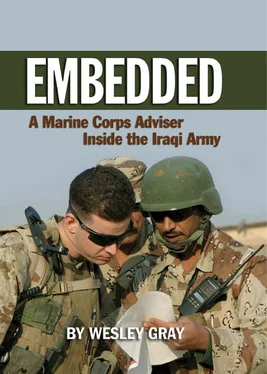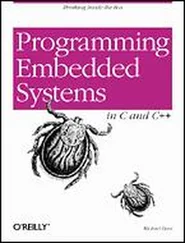Colonel Abass elaborated further on what America calls freedom. “Let me just tell you that freedom is not a healthy thing in Iraq,” he declared. “You must remember that Iraqis are like caged lions. Imagine if you had a lion in a cage all of its life and then you let it out of the cage without any guidance or rules. This lion will do whatever it wants and wreak havoc. This is the mindset of the Iraqi people. The Americans dropped freedom in their laps and they acted like freed lions. The Iraqis have never lived with freedom or lived as a civil people. They have not had the chance to learn how to do it.”
I reflected on Colonel Abass’s statements. “Jamal, you know, the freedom Americans have granted Iraqis is not the same freedom Americans have,” he continued. “Americans are not free like Iraqis are free. Americans cannot kill their neighbor for stealing their goat, cannot shoot an enemy because of a tribal feud, cannot kill their daughter for ruining the honor of her family. Americans do not have our freedom. They are simply free to operate in a highly constrained civilized system. The freedom granted to Iraqis is the truest of freedoms. It allows everyone to do anything they want without repercussion. In one word, anarchy. The only true freedom. Anarchy is what America has granted Iraq.”
Still processing what the colonel had said, I responded, “Sir, what do you see happening? How do you see all of this playing out?” Abass paused to think for a bit. “Are you familiar with the civil war that occurred in Lebanon?” he asked me. “I see our crisis working very similar to theirs. I see America leaving soon after they realize they are only exacerbating the problems in our country and their dream of a democratic Iraq becomes hopeless. Once they leave there will be civil war and a struggle for power within Iraq. This struggle may last one year or it may last fifteen, as it did for the Lebanese, but eventually people will get tired of fighting and the leaders will sit down at the negotiating table and work out some sort of deal. The end game here is very predictable and has been played out many times in this region.”
I hate to admit it, but I think Colonel Abass is a man to be listened to, even though everything he says spits in the face of the logic and rhetoric that comes from the Bush administration. His description of the Iraqi people as caged lions may sound as though he is saying the people act like wild animals and have no sense of civility without a cage around them. Unfortunately, his assessment, in a general sense, is correct. The Iraqi people are completely different because they live in completely different circumstances. All they know is violence as a means to an end. All they know is dictatorship and power as a means to control the population.
In hindsight it seems foolish for George W. Bush to claim that we are granting the Iraqi people freedom. What he really means is that we want to grant Iraqis the freedom to act in a society that constrains the actions of citizens. What we have given them is freedom in the truest sense, or in other words, anarchy. The questions Iraqis rightfully ask us are simple: how can America grant us freedom and then all of a sudden expect us to conform to the many rules a free society inherently accepts and abides by? What if we don’t want to have other people practicing other religions here? What if we want to practice two-thousand-year traditional tribal practices of stoning women who commit adultery? What if we want to implement Islamic Sharia law? What if we want to implement honor killings? You gave us freedom, right?
I think America has made a huge strategic blunder in assuming that Iraqis would perceive freedom and democracy in the same way Westerners do.
Chapter 25
America Never Looked So Good
January–February 2007
One morning in January I went into the MiTT COC to catch up on the latest news. It was not happy. Once again I was reminded of just how dangerous and volatile Al Anbar Province could be. A massive IED had struck a Marine Humvee, killing Navy corpsman Matthew Conte and Marine gunnery sergeant Terry Elliot. In addition, two other Marines had to be evacuated for urgent surgical wounds and their survival was questionable. I just hoped that their families had the strength when they heard the news.
Sickened by the news of more Marines dying, I went to turn off the Internet. Suddenly an instant message window popped onto the screen. It was a college fraternity friend of mine who worked and lived in New York City. He, like most Americans, wanted to thank me for my service. While I really appreciated his concern, he inadvertently said something that showed his ignorance. He asked, “Wes, has your wife had time to visit you out there in Iraq?” I didn’t really know how to respond. Here I was chatting with an Ivy League-educated Wall Street investment banker and he didn’t have a clue about the situation in Iraq. Ridiculous.
I wasn’t mad at him for his comments, but I feared that his ignorance was representative of many Americans who were never forced to deal with the realities and costs of war. Unfortunately, these same people also vote for what happens in war. Any time decision makers aren’t forced to recognize the costs of their decisions, they are destined to make poor decisions.
We All Want to Escape Iraq
The final days at Camp Ali were some of the best I’d had in Iraq. Now that things were winding down and the few jundi I still advised were taking care of their own respective functions, I spent my time learning about Iraqi culture and experiences.
One afternoon I stopped by the terp hooch—my favorite destination for good conversation. Mark, Moody, Imus, and Martin were all available for discussion. Because the end was so near for me, and the terps would have loved to be in my shoes, the topic for the day was how to escape from Iraq. Mark’s story had to be the most captivating. He told us the tale of his brother’s harrowing escape from Iraq and into Sweden.
Mark’s story began after the Gulf War (1990–91). Because of the security situation in Baghdad and turmoil after the war, Mark’s family fled to Iran. After a few years they caught the “Kurdish pride” bug. This disease forced them to return to Kurdish lands in northern Iraq, where they would be surrounded with their family from generations before. Everyone was keen on the idea except Yasser, who felt there were no opportunities for him in Iraq. He had his eyes set on Europe.
Despite the impossible odds Yasser commenced his mission to escape Iraq in mid-1993. The first stage of his journey involved attaining a fake Iranian passport and sneaking into Iran. Once in Iran, the next stage for Yasser was to make his way north into Russia. Typically, the cost needed to bribe people along the way was prohibitive, but Yasser had saved the appropriate amount of money from selling Persian rugs on the black market in Iraq over the previous couple of years. In mid-1994 he made it to Moscow.
While in Russia Yasser rented a studio apartment and dated a local Russian woman who could show him around the city and teach him the language. Life was good—for the time being. In 1995 economic turmoil struck the country. A survivor by nature, Yasser saw the turmoil as an opportunity to escape to Europe, his final destination. As soon as it was possible Yasser jumped on a train to Lithuania, which had recently opened a policy to accept Iranians into their country. Bribery and Yasser’s fake Iranian passport were going to come in handy for a second time.
Once in Lithuania Yasser scoured the country for work, but with no luck. After spending six months living on the streets, the situation was dire. Thankfully an opportunity finally came knocking: A new black market transport operation had opened for business and was offering to smuggle individuals on a cruise boat that traveled between Sweden and Lithuania.
Читать дальше












